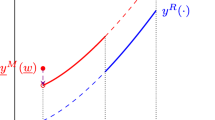Abstract
When a single group uses majority rule to select a set of policies from an n-dimensional compact and convex set, a core generally exists if and only if n = 1. Finding analogous conditions for core existence when an n-dimensional action requires agreement from m groups has been an open problem. This paper provides a solution to this problem by establishing sufficient conditions for core existence and characterizing the location and dimensionality of the core for settings in which voters have Euclidean preferences. The conditions establish that a core may exist in any number of dimensions whenever n ≤ m as long as there is sufficient preference homogeneity within groups and heterogeneity between groups. With m > 1 the core is however generically empty for \({n > \frac{4m-2}{3}}\). These results provide a generalization of the median voter theorem and of non-existence results for contexts of concern to students of multiparty negotiation, comparative politics and international relations.
Similar content being viewed by others
References
Austen-Smith D, Banks JS (2000) Positive political theory, vol 1. University of Michigan Press, Ann Arbor
Black D (1958) Theory of committees and elections. Cambridge University Press, Cambridge
Bräuninger T (2003) When simple voting doesn’t work: multi-chamber systems for the representation and aggregation of interests in international organisations. Br J Polit Sci 33: 107–131
Cox G, McKelvey R (1984) A Ham Sandwich theorem for general measures. Soc Choice Welf 1: 75–83
Feld S, Grofman B, Miller N (1988) Centripetal forces in spatial voting: on the size of the yolk. Pub Choice 59: 37–50
Evans, P, Jacobson, H, Putnam, R (eds) (1993) Double-edged diplomacy: international bargaining and domestic politics. University of California Press, Berkeley
Hammond TH, Miller GJ (1987) The core of the constitution. Am Polit Sci Rev 81: 1155–1174
Hill TP (1988) Common hyperplane medians for random vectors. Am Math Mon 95: 437–441
Keerthi SS, Sancheti NK, Dattasharma A (1992) Transversality theorem: a useful tool for establishing genericity. In: Proceedings of the 31st IEEE conference on decision and control, vol 1, pp 96–101, Tucson, AZ
McKelvey R, Schofield N (1987) Symmetry at a core point. Econometrica 55: 923–933
Nakamura K (1979) The vetoers in a simple game with ordinal preference. Int J Game Theory 8: 55–61
Plott CR (1967) A notion of equilibrium and its possibility under majority rule. Am Econ Rev 57: 787–806
Pontriagin LS (1952) Foundations of combinatorial topology. Graylock Press, NY
Saari D (1997) The generic existence of a core for q-rules. Econ Theory 9: 219–260
Schofield N (1978) Instability of simple dynamic games. Rev Econ Stud 45: 575–594
Schofield N (1984) Social equilibrium and cycles on compact sets. J Econ Theory 33: 59–71
Schofield N (1985) Social choice and democracy. Springer, Berlin
Schofield N (1999) The C-1 topology on the space of smooth preference profiles. Soc Choice Welf 16: 445–470
Steinhaus H (1945) Sur la division des ensembles de l’espace par les plans et des ensembles plans par les circles. Fund Math 33: 245–263
Strnad J (1985) The structure of continuous-valued neutral monotonic social functions. Soc Choice Welf 2(2): 181–195
Tsebelis G, Money J (1997) Bicameralism. Cambridge University Press, Cambridge
Author information
Authors and Affiliations
Corresponding author
Rights and permissions
About this article
Cite this article
Humphreys, M. Existence of a multicameral core. Soc Choice Welfare 31, 503–520 (2008). https://doi.org/10.1007/s00355-007-0293-5
Received:
Accepted:
Published:
Issue Date:
DOI: https://doi.org/10.1007/s00355-007-0293-5




